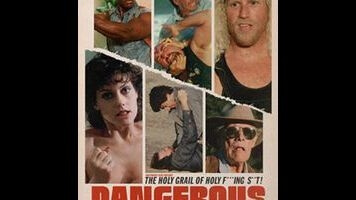Perhaps it’s best to treat Dangerous Men as a transmission from an alien world, one that happened to exist within the imagination of an Iranian immigrant named Jahangir Salehi Yeganehrad, a.k.a. John Rad, the writer, director, producer, editor, production designer, and composer of the film. No backstory is required to enjoy the movie, but it is interesting to note that although Dangerous Men took 26 years to complete—shooting began in the late ’70s and was completed in the mid-’90s, with post-production lasting until 2005—the aesthetics retain the same big-haired, Rude Dog-clad, SoCal beach-bum aesthetic throughout, suggesting a singular creative force behind the camera. (“Auteur” is a strong word.)
The initial plot revolves around Mira (Melody Wiggins), who just got engaged to her doting boyfriend Daniel (Kelay Miller). They’re celebrating their love with an idyllic beach date when two aggressive bikers show up and threaten to rape Mira. (It should be noted that basically every man in this movie who isn’t one of our heroes is a predatory rapist as well as a gullible idiot, which complicates the “goofy fun” aspect a bit.) Daniel fights back and Mira manages to escape unharmed, although Daniel and one of the bikers are killed in the struggle. Mira accompanies the surviving biker to an appropriately sleazy motel, where she seduces him and stabs him to death; she flees on foot and is picked up by another attacker in a pickup truck, prompting her transformation into an (attempted) rape-revenge superhero/serial killer. Gradually, the movie drifts into the adventures of her would-be brother-in-law (Michael Gradilone), an LAPD detective who, as is made clear repeatedly, is supposed to be on vacation. David’s quest to avenge his brother leads him to a drug kingpin with the delightful nickname of Black Pepper (Bryan Jenkins)—although he’s credited as “head of drug dealers” in the credits.
Rad, who died in 2007, must have loved movies to spend so many years finishing this one. But beyond the basics of “shot/reaction shot”—and even that’s inconsistent—he doesn’t seem to have picked up much from them. The cheap sets are typical of a zero-budget B-movie. (Black Pepper’s hideout is a cramped apartment, and the set dressing consists of mattresses on the floor and the occasional velvet painting.) The action sequences, in which no one runs from danger, puts any momentum behind a punch, or generally gets their heart rate above 80—seeing his friend lying dead on the ground, one character says, “aw, man,” like he just got a parking ticket—are less so.
Nudity and leering upskirt shots abound, but Rad’s understanding of sex appears elementary-school level: “When I come over to you, I want you to rub my knees, lightly. At the same time, lick my belly button,” Mira instructs one of her targets. Several characters deliver monologues to dead people, typical of the clunky-yet-inexplicable dialogue. (Sample line: “I must be out of my mind. You’re crazy!”) Rad does have an undeniable flair with a Casio, though, and the soundtrack features several quite hummable tunes. Ridiculous, artless, and wildly entertaining, Dangerous Men is more than the sum of its fascinatingly misguided parts, although it will take a special sort of moviegoer to truly appreciate (or endure, depending on your perspective) its charms. Its instant cult-classic status is all but assured.


 Keep scrolling for more great stories from A.V. Club.
Keep scrolling for more great stories from A.V. Club.